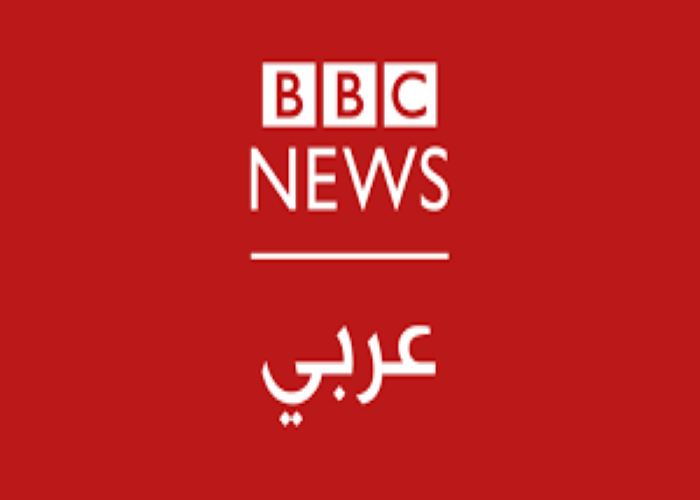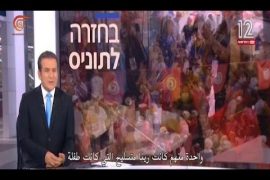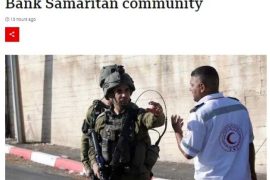On March 25th the BBC World Service put out the following Tweet:
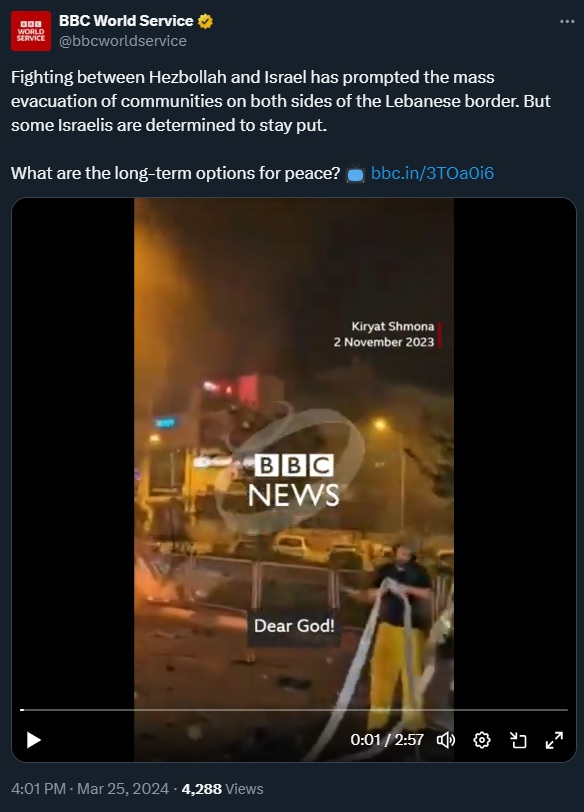
The link that follows the question “What are the long-term options for peace?” leads to a twelve-minute ‘documentary’ which does not address the topic of the Tweet.
Titled “Is there a way to get Israeli-Palestinian peace back on track?”, that BBC World Service film was produced by BBC Arabic in early December 2023 and is presented by Issam Ikirmawi.
“The contradictions and obstacles preventing Israeli-Palestinian peace from breaking out 25 years ago have grown, if anything, more complex.
Many argue there is no military solution to this conflict, and that peace will only come if Israelis and Palestinians accept the other’s right to statehood. But advocates of a two-state solution believe the violence unleashed since October have paradoxically advanced their cause. As the international community searches for a solution to end this round of violence, global leaders are exploring the possibility of a more lasting peace – and a familiar phrase has resurfaced, the ‘Two State Solution’. BBC Arabic’s Issam Ikirmawi explores what it means and why it has failed in the past.”
With references to the two-state solution once again becoming a frequent feature in BBC coverage of the current conflict, it is worth examining the narrative that the BBC promotes to its audiences – and itself – on that issue.
Ikirmawi tells viewers that Israel’s current prime minister opposes the two-state solution and that in September 2023, he “accused the Palestinians of not recognising the Jewish state of Israel”.
The speech to which Ikirmawi refers included the following:
“For peace to prevail the Palestinians must stop spewing Jew-hatred and finally reconcile themselves to the Jewish state. By that I mean not only to the existence of the Jewish state but to the right of the Jewish people to have a state of their own in their historic homeland, the Land of Israel.”
Having promoted the notion of the terrorist organisation Hamas as a “resistance movement”, Ikirmawi goes on to claim that “the PA has long supported a two-state solution and recognises Israel”.
As has been documented here in the past, the Palestinian Authority led by Fatah’s Mahmoud Abbas has in fact long rejected recognition of Israel as the Jewish state. Notably, Ikirmawi makes no mention of the PA’s funding of terrorism even when he promotes Mahmoud Abbas’ claim that Israel is “no longer acting as a partner for peace”.
Ikirmawi goes on to promote the notion of “illegal settlements” as a “barrier to peace”, describing such Israeli communities as having been built “on occupied Palestinian land” despite the fact that the land concerned has never belonged to a Palestinian state. Ikirmawi’s unqualified portrayal of such communities as being “illegal” under international law follows the usual BBC template which fails to inform audiences of differing legal opinions.
Citing the political NGO ‘Peace Now’, Ikirmawi claims that “2023 has set a record for settlement construction in the West Bank”. In fact, the numbers published by Israel’s Central Bureau of Statistics show that claim – made before the year had even ended – to be inaccurate.
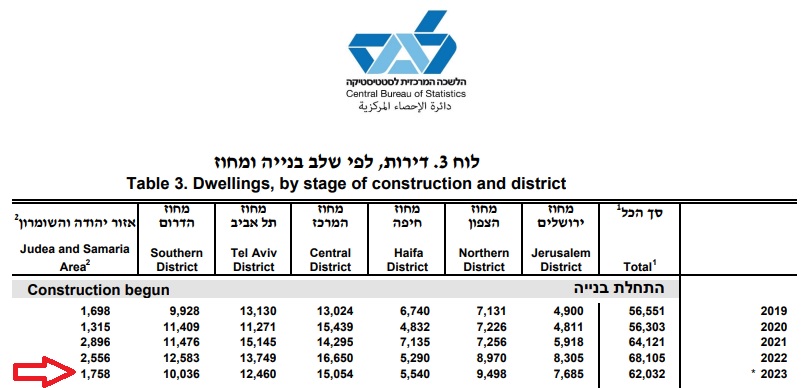

Ikirmawi brings in a controversial Palestinian academic (the daughter of Saeb Erekat) – who stated that the atrocities of October 7th were “just a normal human struggle 4Freedom” – to claim that there are “more than 750,000 settlers in the West Bank”.
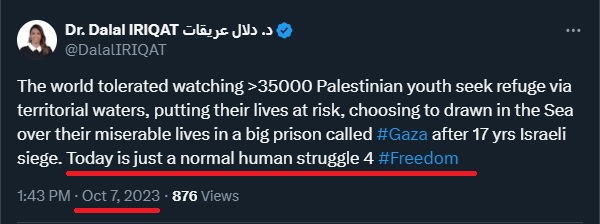
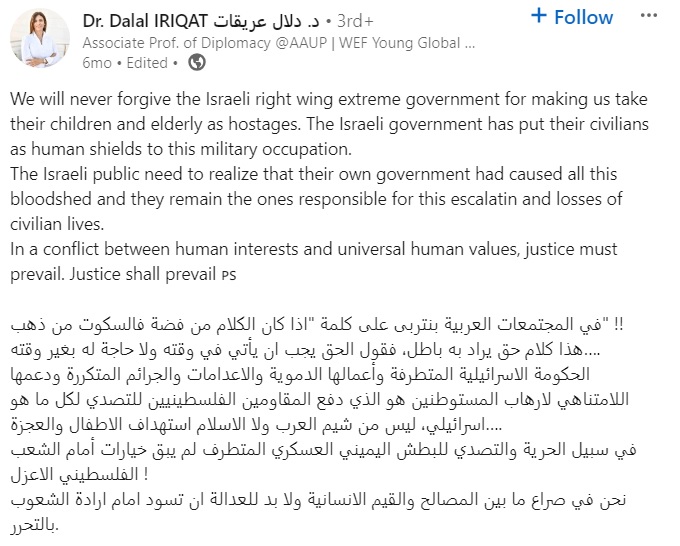
In fact, at the end of December 2023, the Israeli population of Judea & Samaria stood at 517,407.
Ikirmawi then purports to inform BBC audiences on the topic of the history of the two-state solution, choosing the 1947 Partition Plan as his starting point and telling viewers that:
“The Palestinians rejected the plan while Jewish armed groups wasted no time in taking over towns and villages.”
In other words, viewers are told nothing about the Mandate for Palestine’s objective of creating a Jewish homeland or the fact that Jews accepted the proposal while Arabs – not just Palestinians – rejected it. Ikirmawi likewise erases the invasion of nascent Israel by five Arab armies in May 1948 from the picture, along with the subsequent Jordanian occupation of Judea & Samaria and parts of Jerusalem and the Egyptian occupation of the Gaza Strip. His mention of the ‘Nakba’ fails to mention the part played by Arab leaders in the “displacement of hundreds of thousands of people”.
Providing no background or context, Ikirmawi goes on to tell viewers that “Israel won another war in 1967 and occupied the remaining land”. With no mention whatsoever of the Yom Kippur war, he moves on to the topic of the Oslo Accords, inaccurately telling viewers that they “envisioned a two-state solution to bring an end to the conflict” and referencing an “early promise of an independent Palestinian state”.
As we all too often have cause to point out on these pages, the Oslo Accords in fact made no mention of the two-state solution and did not ”promise” a Palestinian state.
Ikirmawi promotes the notion that the assassination of Yitzhak Rabin in 1995 “left the peace process in ruins” and goes on to bring in a commentator who believes that Israel murdered Yasser Arafat to claim that Netanyahu “killed the peace” despite the fact that Netanyahu signed the Protocol Concerning the Redeployment in Hebron in 1997 and the Wye River Memorandum in 1998. The Sharm El Sheikh memorandum of 1999 likewise does not get a mention in Ikirmawi’s portrayal.
While Ikirmawi’s portrayal of the 1977 “founding charter of Netanyahu’s Likud party” is historically accurate, he fails to tell viewers that it was under the Likud party that Israel disengaged from the Gaza Strip in 2005.
Ikirmawi tells viewers that “it’s clear that Israel has seen a big political shift to the right since the Oslo Accords” while managing to completely avoid the topic of the effects of the second Intifada and the sharp rise in Palestinian terrorism from the Gaza Strip after the 2005 disengagement.
Ikirmawi presents an airbrushed account of the results of a November 2023 poll of Palestinians, failing to tell BBC audiences that in addition to 17% support for a two state solution, it revealed that 59% of the participants strongly supported and 16% supported to some extent the atrocities carried out by Hamas on October 7th.
Ignoring the support for Hamas – with its platform of rejection of any peaceful resolution to the conflict – in Palestinian society, Ikirmawi’s ‘blame Israel for the absence of a two state solution’ piece also tells viewers that: [emphasis added]
“The bloodshed that followed the October 7th attacks has brought the elusive quest for a lasting peace to the Israeli Palestinian conflict back into sharp focus.”
Unsurprisingly, this BBC Arabic production makes no effort to document or investigate the links between Palestinian approval for Hamas’ slaughter of Israelis and the absence of “a lasting peace”. Neither does it tell BBC audiences anything about the Palestinian leadership’s multiple past rejections of peace offers.
One thing this dumbed down ‘documentary’ does do, however, is to shed light on the attitudes and journalistic integrity of those bringing BBC audiences their ‘news’, including the BBC World Service which found fit to re-promote this blatantly one-sided item, replete with highly relevant omissions that actively compromise audience understanding of the issue.

